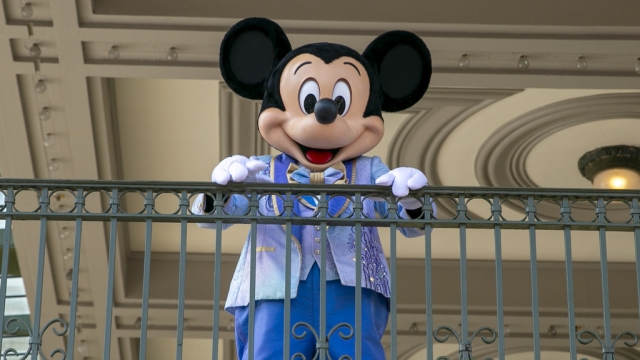Ninety-six years after their first big-screen appearance, two of the most iconic and recognizable characters in the world are sailing straight into the public domain.
It marks the first time the characters of Mickey and Minnie Mouse can freely be used by artists, writers, and filmmakers in their artwork, books, or films without the fear of legal action from The Walt Disney Company.
"This is the juggernaut. This is it. This is Mickey Mouse," said Duke University School of Law Professor Jennifer Jenkins.
But just to be clear, it's not the modern Mickey we know today with his bright red pants and cartoonish voice—it's the mischievous, voiceless, and black-and-white boat captain from "Steamboat Willie."
The short film debuted in 1928 as a technical marvel—the first cartoon to feature synchronized sound. But today, the eight-minute animation is remembered more as the work that catapulted the career of Walt Disney, introduced the world to Disney's longest-running mascots, and helped change copyright law as we know it.
"I kind of feel like the pipe on the steamboat, like expelling smoke," said Jenkins. "It's so exciting that it's finally here. I mean, when I started my job, as a joke, I had a 'Free the Mouse' bumper sticker."
"Steamboat Willie" was originally supposed to enter the public domain in 1984, when the film turned 56, and again in 2004, when the film turned 75. But as Disney became the entertainment powerhouse it still is today, the company lobbied the U.S. government to pass two copyright protection acts to extend its exclusive ownership over the character.
Critics referred to this as the "Mickey Mouse Protection Act," but that comes to an end this year.
"It's exhilarating. But I've been feeling this exhilarating feeling since 2019, because that's the first time after a 20-year drought that any published work at all entered the public domain in the United States," said Jenkins.
The extended copyright terms didn't just stop Mickey and Minnie Mouse from entering the public domain. It also stopped any work of fiction from losing its copyright from 1999 to 2019. That included books like "The Great Gatsby," which entered the public domain in 2021, and A.A. Milne's original "Winnie-the-Pooh," which joined the public the next year.
The characters have since been adapted into graphic novels, video games, a Broadway musical, and a horror movie. All of that could likely soon happen to "Steamboat Willie," but that doesn't mean there's no legal risk at all, as Disney can still claim copyright over later iterations of its characters, including the iconic Sorcerer Mickey from the 1940 film "Fantasia."
A spokesperson from The Walt Disney Company noted: "More modern versions of Mickey will remain unaffected by the expiration of the Steamboat Willie copyright, and Mickey will continue to play a leading role as a global ambassador for the Walt Disney Company in our storytelling, theme park attractions, and merchandise."
Beyond copyright, the House of Mouse also holds a trademark on its famous character, meaning only The Walt Disney Company can use Mickey as its logo and corporate mascot.
That means you can't pretend to be The Walt Disney Company by using the Mickey Mouse branding. But if you want to write your own version of "Steamboat Willie," feel free to go full steam ahead.
SEE MORE: Disney opens its first 'Frozen'-themed attraction
Trending stories at Scrippsnews.com



